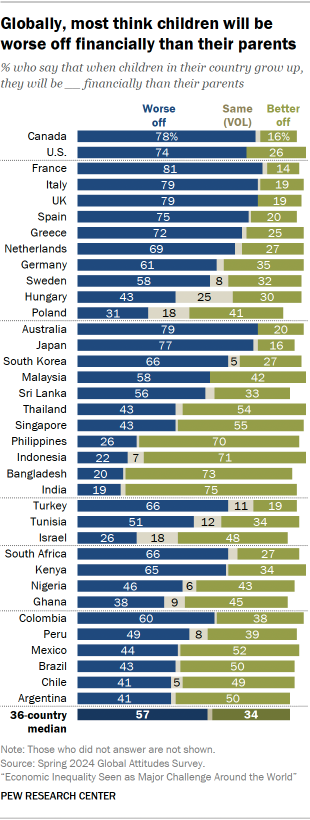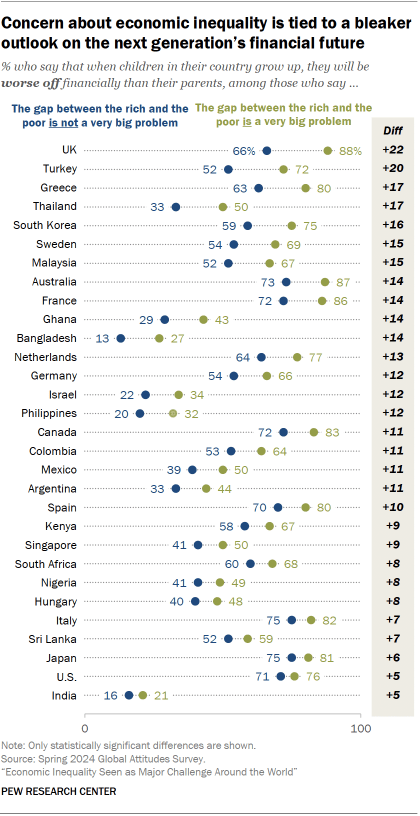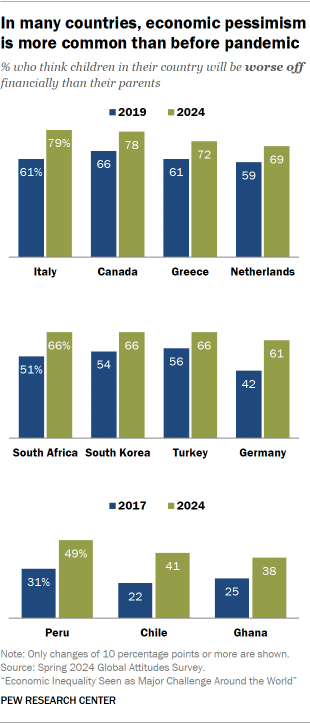Skip to content
In all the nations we surveyed, people are generally pessimistic about the financial future of the next generation in their country. A median of 57% say their children will grow up to be worse off financially than their parents, compared to a median of 34% who say they will be better off.
In high-income countries, Canada and the US, about three-quarters of adults believe children will be worse off.
Similarly high shares are pessimistic in most of the surveyed European countries, all of which are high-income countries. About three-quarters or more in France, Greece, Italy, Spain and the United Kingdom say their children will grow up to be financially worse off than their parents.
Poland is the only European country where people are more likely to offer a more optimistic view of the next generation’s financial future: 41% of Poles say their children will be better off, while 31% say they will be worse off. Another 18% of Poles voluntarily say that their future financial situation will be roughly the same.
In the Asia-Pacific region, attitudes are most negative in Australia, Japan and South Korea, where about two-thirds or more say children will be worse off than their parents. People in Malaysia and Sri Lanka are also pessimistic on this issue.
In six other Asia-Pacific countries surveyed, people are more likely to say children will be better off financially than their parents. At least seven out of ten hold this view in Bangladesh, India, Indonesia and the Philippines. Singapore is the only high-income Asia-Pacific nation where people say children will be better off.
Of the Middle East and North African countries surveyed, people in Turkey have a particularly dim view of children’s financial futures. About two-thirds of Turks say that children in their country will be worse off than their parents.
In sub-Saharan Africa, about two-thirds of adults in Kenya and South Africa also say children will be worse off than their parents.
In the surveyed Latin American countries, opinions are divided. In Colombia and Peru, more people say that children will be worse off than better off, but in Argentina it is the other way around.
Views towards the perception of economic inequality
There is a clear relationship between people’s perception of economic inequality in their country and how they see the financial future of the next generation.
In most countries, people who see the gap between rich and poor as a big problem are particularly pessimistic about how their children will fare financially when they grow up.
Likewise, dissatisfaction with the current economic situation and the functioning of democracy is linked to the feeling that children will be financially worse off than their parents in the future.
Attitudes according to the opinion of the ruling party
The belief that children will grow up to be financially worse off than their parents is also more common among people who do not support their country’s ruling party. For example, in Hungary, 57% of people who do not support the ruling party say that their children will grow up to be financially worse off than their parents. This opinion is shared by only 20% of Hungarians who support the ruling party. (Read Appendix B for the classification of ruling parties from spring 2024)
Reviews by age and income
In most countries, older and younger adults generally have the same view of children’s financial future. There are also some big differences by income level.
How views of the next generation’s financial future have changed over time
In the 15 surveyed countries, the public’s economic prospects are worse today than before the coronavirus pandemic. For example, the share of Germans who think their children will grow up to be financially worse off than their parents has increased by 19 percentage points since 2019 – from 42% then to 61% today.
Source link
OWNERDOMAIN=adtechsolutions.net
MANAGERDOMAIN=themoneytizer.com
themoneytizer.com,128086,DIRECT
smartadserver.com, 1097, DIRECT, 060d053dcf45cbf3
pubmatic.com, 156439, RESELLER, 5d62403b186f2ace
pubmatic.com, 154037, RESELLER, 5d62403b186f2ace
rubiconproject.com, 16114, RESELLER, 0bfd66d529a55807
openx.com, 537149888, RESELLER, 6a698e2ec38604c6
appnexus.com, 3703, RESELLER, f5ab79cb980f11d1
loopme.com, 5679, RESELLER, 6c8d5f95897a5a3b
video.unrulymedia.com, 2564526802, RESELLER, 6f752381ad5ec0e5
smaato.com, 1100044045, RESELLER, 07bcf65f187117b4
pubnative.net, 1006576, RESELLER, d641df8625486a7b
adyoulike.com, b4bf4fdd9b0b915f746f6747ff432bde, RESELLER, 4ad745ead2958bf7
axonix.com, 57264, RESELLER, bc385f2b4a87b721
admanmedia.com, 43, RESELLER
sharethrough.com, OAW69Fon, RESELLER, d53b998a7bd4ecd2
contextweb.com, 560288, RESELLER, 89ff185a4c4e857c
contextweb.com, 563115, RESELLER, 89ff185a4c4e857c
adcolony.com, 496220845654deec, RESELLER, 1ad675c9de6b5176
appads.in, 107606, RESELLER
rubiconproject.com, 24600, RESELLER, 0bfd66d529a55807
pubmatic.com, 156177, RESELLER, 5d62403b186f2ace
rubiconproject.com, 17328, RESELLER, 0bfd66d529a55807
rubiconproject.com, 11740, RESELLER, 0bfd66d529a55807
rubiconproject.com, 22014, RESELLER, 0bfd66d529a55807
kueez.com,1f90819a4cb4c67be57ecf39973f1b97, DIRECT
themediagrid.com, UOT45Z, RESELLER, 35d5010d7789b49d
rubiconproject.com, 16920, RESELLER, 0bfd66d529a55807
openx.com, 557564833, RESELLER, 6a698e2ec38604c6
pubmatic.com, 162110, RESELLER, 5d62403b186f2ace
lijit.com, 407406, RESELLER, fafdf38b16bf6b2b
sharethrough.com, n98xDzeL, RESELLER, d53b998a7bd4ecd2
sonobi.com, 4c4fba1717, RESELLER, d1a215d9eb5aee9e
appnexus.com, 8826,RESELLER, f5ab79cb980f11d1
33across.com, 0010b00002ODU4HAAX, RESELLER, bbea06d9c4d2853c
video.unrulymedia.com, 3486482593, RESELLER
media.net,8CU4JTRF9, RESELLER
disqus.com, 108, RESELLER
onetag.com,6e053d779444c00, RESELLER
adform.com, 2926, RESELLER
improvedigital.com, 2106, RESELLER
smartadserver.com, 4288, RESELLER
loopme.com, 11576, RESELLER
zetaglobal.com, 108, RESELLER
yieldmo.com, 3133660606033240149, RESELLER
flashb.id, 7ea636d8-701f-5b93-9d03-0e5cd43bc8fa, DIRECT
152media.info, 152M33, RESELLER
adform.com, 3125, RESELLER
adyoulike.com, bcf6c423bc90ec180005086dd9935a1b, RESELLER
improvedigital.com, 1723, RESELLER
smartadserver.com, 3389, RESELLER, 060d053dcf45cbf3
rubiconproject.com, 20922, RESELLER, 0bfd66d529a55807
themediagrid.com, QUZDR9, RESELLER, 35d5010d7789b49d
onetag.com, 5cca11704094eb8, RESELLER
openx.com, 559913615, RESELLER, 6a698e2ec38604c6
pubmatic.com, 160107, RESELLER, 5d62403b186f2ace
risecodes.com, 65b9125633dab2000102902c, RESELLER
pubmatic.com, 160295, RESELLER, 5d62403b186f2ace
triplelift.com, 12738, RESELLER, 6c33edb13117fd86
video.unrulymedia.com, 273421059, RESELLER
appnexus.com, 11701, RESELLER
appnexus.com, 3153, RESELLER, f5ab79cb980f11d1
appnexus.com, 11924, RESELLER, f5ab79cb980f11d1
smartadserver.com, 4144, RESELLER
rubiconproject.com, 20736, RESELLER, 0bfd66d529a55807
spotim.market, sp_AYL2022, RESELLER, 077e5f709d15bdbb
appnexus.com, 7664, RESELLER
pubmatic.com, 160925, RESELLER, 5d62403b186f2ace
onetag.com, 7a07370227fc000, RESELLER
nativo.com, 5848, RESELLER, 59521ca7cc5e9fee
33across.com, 0015a00003HljHyAAJ, RESELLER
risecodes.com, 64c7a4acd6298f0001a7d867, RESELLER
xapads.com, 196344, RESELLER
richaudience.com, JAHJ4YZq4O, RESELLER
appnexus.com,15941,RESELLER
openx.com,559680764,RESELLER,6a698e2ec38604c6
rubiconproject.com, 12186, RESELLER, 0bfd66d529a55807
pubmatic.com,156631, RESELLER, 5d62403b186f2ace
sharethrough.com, 23830661, RESELLER, d53b998a7bd4ecd2
contextweb.com, 562965, RESELLER, 89ff185a4c4e857c
zetaglobal.net, 891, RESELLER
mgid.com, 833178 ,RESELLER, d4c29acad76ce94f
amxrtb.com,105199704,RESELLER
onetag.com,5927d926323dc2c,RESELLER
rubiconproject.com, 11006, RESELLER, 0bfd66d529a55807
appnexus.com, 13099, RESELLER
smartadserver.com, 4111, RESELLER
xandr.com, 14082, RESELLER
rubiconproject.com, 23876, RESELLER, 0bfd66d529a55807
openx.com, 537140488, RESELLER, 6a698e2ec38604c6
sharethrough.com, 5926d422, RESELLER, d53b998a7bd4ecd2
media.net, 8CUQ6928Q, RESELLER
sonobi.com, 4a289cdd79, RESELLER, d1a215d9eb5aee9e
video.unrulymedia.com, 335119963, RESELLER
onetag.com, 69f48c2160c8113, RESELLER
themediagrid.com, 4DQHAP, RESELLER, 35d5010d7789b49d
loopme.com, 11362, RESELLER, 6c8d5f95897a5a3b
smartadserver.com, 4284, RESELLER
adform.com, 3119, RESELLER, 9f5210a2f0999e32
freewheel.tv, 1590601, RESELLER
freewheel.tv, 1590606, RESELLER
sharethrough.com, 332baa08, RESELLER, d53b998a7bd4ecd2
33across.com, 0013300001kQj2HAAS, RESELLER, bbea06d9c4d2853c
openx.com, 540274407, RESELLER, 6a698e2ec38604c6
pubmatic.com, 156557, RESELLER
rubiconproject.com, 18694, RESELLER, 0bfd66d529a55807
smaato.com, 1100047713, RESELLER, 07bcf65f187117b4
video.unrulymedia.com, 266978658, RESELLER
aniview.com, 603f65a2e291680ef30af9c7, RESELLER, 78b21b97965ec3f8
appnexus.com, 12637, RESELLER, f5ab79cb980f11d1
appnexus.com, 9382, RESELLER, f5ab79cb980f11d1
appnexus.com, 6849, RESELLER
google.com, pub-6346866704322274, RESELLER, f08c47fec0942fa0
google.com, pub-3565385483761681, RESELLER, f08c47fec0942fa0
google.com, pub-5717092533913515, RESELLER, f08c47fec0942fa0
pubmatic.com, 159277, RESELLER
pubmatic.com, 161335, RESELLER, 5d62403b186f2ace
pubmatic.com, 160993, RESELLER, 5d62403b186f2ace
rubiconproject.com, 13918, RESELLER, 0bfd66d529a55807
rubiconproject.com, 15268, RESELLER
adagio.io, 1015, RESELLER
improvedigital.com, 1790, RESELLER
e-planning.net, 83c06e81531537f4, RESELLER, c1ba615865ed87b2
rubiconproject.com, 19116, RESELLER, 0bfd66d529a55807
pubmatic.com, 159110, RESELLER, 5d62403b186f2ace
33across.com, 0015a00002oUk4aAAC, RESELLER, bbea06d9c4d2853c
appnexus.com, 10239, RESELLER, f5ab79cb980f11d1
rubiconproject.com, 16414, RESELLER, 0bfd66d529a55807
pubmatic.com, 156423, RESELLER, 5d62403b186f2ace
conversantmedia.com, 100141, RESELLER
smartadserver.com, 3554, RESELLER
lijit.com, 367236, RESELLER, fafdf38b16bf6b2b
openx.com, 538959099, RESELLER, 6a698e2ec38604c6
pubmatic.com, 137711, RESELLER, 5d62403b186f2ace
pubmatic.com, 156212, RESELLER, 5d62403b186f2ace
rubiconproject.com, 17960, RESELLER, 0bfd66d529a55807
connectad.io, 456, RESELLER, 85ac85a30c93b3e5
rubiconproject.com, 26800, RESELLER, 0bfd66d529a55807
improvedigital.com, 1033, RESELLER
appnexus.com, 2579, RESELLER
improvedigital.com, 1220, RESELLER
quantum-advertising.com, 4758, RESELLER
improvedigital.com, 1602, RESELLER
improvedigital.com, 2195, RESELLER
openx.com, 540860183, DIRECT, 6a698e2ec38604c6
openx.com, 540952727, DIRECT, 6a698e2ec38604c6
gumgum.com, 13857, RESELLER, ffdef49475d318a9
rubiconproject.com, 23434, RESELLER, 0bfd66d529a55807
pubmatic.com, 157897, RESELLER, 5d62403b186f2ace
appnexus.com, 2758, RESELLER, f5ab79cb980f11d1
contextweb.com, 558355, RESELLER, 89ff185a4c4e857c
openx.com, 537149485, RESELLER, 6a698e2ec38604c6
improvedigital.com, 1884, RESELLER
smartadserver.com, 4005, RESELLER, 060d053dcf45cbf3
admedia.com, 1606, RESELLER
iqzone.com, IQ204, RESELLER
admanmedia.com, 799, RESELLER
seedtag.com, 61a78375e0fb8f0800ec50fb, DIRECT
lijit.com, 397546, DIRECT, fafdf38b16bf6b2b
onetag.com, 75601b04186d260, DIRECT
xandr.com, 4009, DIRECT, f5ab79cb980f11d1
smartadserver.com, 3050, DIRECT
pubmatic.com, 157743, DIRECT, 5d62403b186f2ace
rubiconproject.com, 17280, DIRECT, 0bfd66d529a55807
improvedigital.com, 1680, DIRECT
adyoulike.com, 83d15ef72d387a1e60e5a1399a2b0c03, DIRECT
sharethrough.com, AXS5NfBr, DIRECT, d53b998a7bd4ecd2
adform.com, 1889, RESELLER
openx.com, 558758631, RESELLER, 6a698e2ec38604c6
loopme.com, 11712, RESELLER, 6c8d5f95897a5a3b
video.unrulymedia.com, 724823153, RESELLER
amxrtb.com, 105199542, DIRECT
rubiconproject.com, 23844, RESELLER
adform.com, 2865, RESELLER
openx.com, 559680764, RESELLER
appnexus.com, 12290, RESELLER
lijit.com, 260380, RESELLER
pubmatic.com, 161527, RESELLER
sharethrough.com, a6a34444, RESELLER, d53b998a7bd4ecd2
smartadserver.com, 3056, RESELLER
themediagrid.com, 7WYFHG, DIRECT, 35d5010d7789b49d
trustedstack.com, TS7LELSN3, DIRECT
rubiconproject.com, 26144, RESELLER, 0bfd66d529a55807
pubmatic.com, 164187, RESELLER, 5d62403b186f2ace
amxrtb.com, 105199734, RESELLER
media.net, 8CU67TH23, RESELLER
openx.com, 559911747, RESELLER, 6a698e2ec38604c6
yieldmo.com, 3377199372461613093, RESELLER
onetag.com, 87f58fe90234d0e, RESELLER
video.unrulymedia.com, 799061815, RESELLER
smartadserver.com, 5302, RESELLER, 060d053dcf45cbf3
iqzone.com, IQ326, RESELLER
adtelligent.com, 315476, DIRECT, 8ce87912eb022a51
152media.info, 152M10, RESELLER
33across.com, 0010b00002T3JniAAF, RESELLER, bbea06d9c4d2853c
xandr.com, 11924, RESELLER, f5ab79cb980f11d1
lijit.com, 310770, RESELLER, fafdf38b16bf6b2b
onetag.com, 59a18369e249bfb, RESELLER
pubmatic.com, 161562, RESELLER, 5d62403b186f2ace
vidoomy.com, 2252369, RESELLER
video.unrulymedia.com, 3139274702404301777, RESELLER, 6f752381ad5ec0e5
orangeclickmedia.com, ach5lxtq1pmgjoz4, RESELLER, cd730d2f56b472c4
adform.com, 2656, RESELLER, 9f5210a2f0999e32
richaudience.com, RxVFrJzPTg, RESELLER
xandr.com, 14674, RESELLER, f5ab79cb980f11d1
markappmedia.site, 533994, RESELLER
amxrtb.com, 105199328, RESELLER
media.net, 8CU816538, RESELLER
rubiconproject.com, 20086, RESELLER, 0bfd66d529a55807
teads.tv, 11398, DIRECT, 15a9c44f6d26cbe1
teads.tv, 26130, DIRECT, 15a9c44f6d26cbe1
adform.com, 2623, DIRECT, 9f5210a2f0999e32
smilewanted.com, 1362, RESELLER
pubmatic.com, 158810, RESELLER, 5d62403b186f2ace
appnexus.com, 10040, RESELLER
smartadserver.com, 2491, RESELLER
rubiconproject.com, 19814, RESELLER, 0bfd66d529a55807
openx.com, 557083110, RESELLER, 6a698e2ec38604c6
lijit.com, 346012, DIRECT, fafdf38b16bf6b2b
improvedigital.com, 1010, RESELLER
indexexchange.com, 193216, RESELLER
adform.com, 3027, RESELLER
sharethrough.com, TZ1ahFV8, RESELLER, d53b998a7bd4ecd2
smaato.com,1100055901, RESELLER, 07bcf65f187117b4
smaato.com, 1100004890, RESELLER, 07bcf65f187117b4
33across.com, 001Pg000009Gtq2IAC, DIRECT, bbea06d9c4d2853c
loopme.com, 11468, RESELLER, 6c8d5f95897a5a3b
video.unrulymedia.com, 1767448067723954599, RESELLER
vidoomy.com, 7763608 , RESELLER
adform.com, 2742, RESELLER
onetag.com, 7f5d22b0006ab5a, RESELLER
152media.info, 152M728, RESELLER
videoheroes.tv, 212648, RESELLER, 064bc410192443d8
amxrtb.com, 105199841, RESELLER
adwmg.com, 100746, RESELLER
risecodes.com, 64a420c03a7fe2000132115a , DIRECT
lijit.com, 405318, RESELLER, fafdf38b16bf6b2b
smaato.com, 1100057444, RESELLER, 07bcf65f187117b4
inmobi.com, 9e311c7a68e94888aac7fbb4272381e2, RESELLER, 83e75a7ae333ca9d
gumgum.com, 16112, RESELLER, ffdef49475d318a9
themediagrid.com, HW1PGR, RESELLER, 35d5010d7789b49d
amxrtb.com, 105199691, RESELLER
zetaglobal.net, 716, RESELLER
onetag.com, 2a897e3f18e6769, DIRECT
pubmatic.com, 161593, RESELLER, 5d62403b186f2ace
taboola.com,1347547,DIRECT,c228e6794e811952
pubmatic.com, 156307, RESELLER, 5d62403b186f2ace
appnexus.com, 3364, RESELLER
indexexchange.com, 183756, RESELLER
contextweb.com, 560382, RESELLER
rubiconproject.com, 16698, RESELLER, 0bfd66d529a55807
openx.com, 539154393, RESELLER
freewheel.tv, 799921, RESELLER
smartadserver.com, 3563, RESELLER
beachfront.com, 13749, RESELLER, e2541279e8e2ca4d
improvedigital.com, 1577, RESELLER
video.unrulymedia.com, 1166984029, RESELLER
smaato.com, 1100047487, RESELLER, 07bcf65f187117b4
sonobi.com, 9a1db44c9c, RESELLER, d1a215d9eb5aee9e
sharethrough.com, RVhuFS44, RESELLER, d53b998a7bd4ecd2
amxrtb.com, 105199725, RESELLER
emxdgt.com, 1643, RESELLER, 1e1d41537f7cad7f
media.net, 8CU292ZDI, RESELLER
yieldmo.com, 3357506016601120771, RESELLER
triplelift.com, 14073, RESELLER, 6c33edb13117fd86
lijit.com, 246013, DIRECT, fafdf38b16bf6b2b
lijit.com, 246013-eb, DIRECT, fafdf38b16bf6b2b
appnexus.com, 1019, RESELLER, f5ab79cb980f11d1
video.unrulymedia.com, 2444764291, RESELLER
contextweb.com, 558511, RESELLER, 89ff185a4c4e857c
krushmedia.com, AJxF6R572a9M6CaTvK, RESELLER
inmobi.com, b01aa06531c543d8a5fb9982f60afb00, RESELLER, 83e75a7ae333ca9d
motorik.io, 100463, RESELLER
smaato.com, 1100056344, RESELLER, 07bcf65f187117b4
smartadserver.com, 4926, RESELLER, 060d053dcf45cbf3
triplelift.com, 4338, RESELLER, 6c33edb13117fd86
richaudience.com, mA6M9Pbvib, RESELLER
appnexus.com, 8233, RESELLER
pubmatic.com, 81564, RESELLER, 5d62403b186f2ace
pubmatic.com, 156538, RESELLER, 5d62403b186f2ace
rubiconproject.com, 13510, RESELLER
adform.com, 1942, RESELLER
lijit.com, 249425, RESELLER
video.unrulymedia.com, 592728597, RESELLER
smartadserver.com, 2640, RESELLER
adyoulike.com, f1dfbb7f133fbdb25c96e7d85a5e628b, RESELLER
themediagrid.com, P19GFJ, RESELLER, 35d5010d7789b49d
smartadserver.com, 1999, RESELLER, 060d053dcf45cbf3
onetag.com, 8d4b087143c49f0, RESELLER
amxrtb.com, 105199794, RESELLER
contextweb.com, 563371, RESELLER, 89ff185a4c4e857c
onetag.com, 7a4244b2979db22, RESELLER
onetag.com, 7a4244b2979db22-OB, RESELLER
openx.com, 539625136, RESELLER
google.com, pub-2128757167812663, RESELLER, f08c47fec0942fa0
google.com, pub-4673227357197067, RESELLER, f08c47fec0942fa0
rubiconproject.com, 17210, RESELLER, 0bfd66d529a55807
appnexus.com, 10264, RESELLER, f5ab79cb980f11d1
pubmatic.com, 156383, RESELLER, 5d62403b186f2ace
themediagrid.com, VIY354, RESELLER, 35d5010d7789b49d
smartadserver.com, 1743, RESELLER, 060d053dcf45cbf3
improvedigital.com, 2048, RESELLER
lijit.com, 257429, RESELLER, fafdf38b16bf6b2b
adform.com, 2474, RESELLER, 9f5210a2f0999e32
triplelift.com, 12911, RESELLER, 6c33edb13117fd86
aps.amazon.com, 93aec77c-f6d2-45bd-affc-a85ab5a72683, RESELLER
onlinemediasolutions.com, 21097, DIRECT, b3868b187e4b6402
rubiconproject.com, 20416, RESELLER, 0bfd66d529a55807
onomagic.com, 210971, DIRECT
rubiconproject.com, 24364, RESELLER, 0bfd66d529a55807
getmediamx.com, 1221097, DIRECT
lijit.com, 374814, RESELLER, fafdf38b16bf6b2b
pubmatic.com, 161332, RESELLER, 5d62403b186f2ace
openx.com, 537153209, RESELLER, 6a698e2ec38604c6
video.unrulymedia.com, 6694405583287859332, RESELLER
themediagrid.com, IRK975, RESELLER, 35d5010d7789b49d
appnexus.com, 11801, RESELLER
appnexus.com, 15629, RESELLER, f5ab79cb980f11d1
appnexus.com, 15127, RESELLER
onetag.com, 7b561459c997848, RESELLER
audienciad.com, 210972, DIRECT
loopme.com, 12733, RESELLER, 6c8d5f95897a5a3b
onetag.com, 75753f1ebcc343c, RESELLER
yieldmo.com, 2757543169808605705, RESELLER
adyoulike.com, e9a771d72c076dbe3cafc2c6477f9238, RESELLER
amxrtb.com, 105199514, RESELLER
aps.amazon.com, 48266a61-b3d9-4cb7-b172-553abc6a42a4, DIRECT
smartadserver.com, 4253, RESELLER
adform.com, 3251, RESELLER, 9f5210a2f0999e32
sharethrough.com, LxFeZvU4, RESELLER, d53b998a7bd4ecd2
videoheroes.tv, 212692, RESELLER, 064bc410192443d8
rubiconproject.com, 25060 , RESELLER, 0bfd66d529a55807
appnexus.com, 12976 , RESELLER, f5ab79cb980f11d1
sharethrough.com, K5WDGAsP, RESELLER, d53b998a7bd4ecd2
smartadserver.com, 3964, RESELLER
pubmatic.com, 161018, RESELLER, 5d62403b186f2ace
adform.com, 3016, RESELLER
lijit.com, 483304, RESELLER, fafdf38b16bf6b2b
pubmatic.com, 161344, RESELLER, 5d62403b186f2ace
contextweb.com ,562794,RESELLER,89ff185a4c4e857c
improvedigital.com, 1805, RESELLER
video.unrulymedia.com, 170071695, RESELLER
criteo.com, B-064322, RESELLER, 9fac4a4a87c2a44f
openx.com, 559792583, RESELLER, 6a698e2ec38604c6
onetag.com, 601a5990b7f5cf7, RESELLER
tappx.com, 42024, RESELLER, 9f375a07da0318ec
sonobi.com, c58cf86903, RESELLER, d1a215d9eb5aee9e
e-planning.net,ea9874674191f1ff, RESELLER,c1ba615865ed87b2
freewheel.tv, 1601610, RESELLER
loopme.com, 11694, RESELLER, 6c8d5f95897a5a3b
sonobi.com, ac6f1a9ded, RESELLER, d1a215d9eb5aee9e
themediagrid.com, B8N9YH, RESELLER, 35d5010d7789b49d
gumgum.com, 15835, RESELLER, ffdef49475d318a9
thebrave.io, 1234750, DIRECT, c25b2154543746ac
appnexus.com, 12061, RESELLER, f5ab79cb980f11d1
media.net, 8CU9B72O6, RESELLER
inmobi.com, ef083d721beb4c0f8776ced01e262c03, RESELLER, 83e75a7ae333ca9d
rubiconproject.com, 24752, RESELLER, 0bfd66d529a55807
adyoulike.com, 994b7b4e03898048761c7110f11e56c2, RESELLER
loopme.com, 11561, RESELLER, 6c8d5f95897a5a3b
video.unrulymedia.com, 3881266972, RESELLER
richaudience.com, q3KyMB36ue, RESELLER
freewheel.tv, 1601388, RESELLER
lijit.com, 273050, RESELLER, fafdf38b16bf6b2b
33across.com, 0010b00002MptSLAAZ, RESELLER, bbea06d9c4d2853c
admixer.net, b0411519-d717-49e1-9051-eaf1cb5280b0, DIRECT
inmobi.com, 61d733c3779d43e590c51c8bc078e10c, RESELLER, 83e75a7ae333ca9d
pubmatic.com, 160846, RESELLER, 5d62403b186f2ace
loopme.com, 11488, RESELLER, 6c8d5f95897a5a3b
e-planning.net,ec771b05828a67fa,RESELLER,c1ba615865ed87b2
video.unrulymedia.com, 851532539, RESELLER
admanmedia.com, 1074, RESELLER
nextmillennium.io, 16425, DIRECT, 65bd090fa4a1e3d6
video.unrulymedia.com, 827123801, RESELLER
rubiconproject.com, 15268, RESELLER, 0bfd66d529a55807
richaudience.com, 9komJKwMhZ, RESELLER
mgid.com, 885240, RESELLER, d4c29acad76ce94f
adform.com, 1762, RESELLER
smartadserver.com, 3627, RESELLER, 060d053dcf45cbf3
adsinteractive.com,39993,RESELLER
adform.com,961,RESELLER
pubmatic.com,158937,RESELLER,5d62403b186f2ace
openx.com,541146395,RESELLER,6a698e2ec38604c6
appnexus.com, 17553, RESELLER, f5ab79cb980f11d1
risecodes.com, 682ede1cb5100100018d47ff, RESELLER
voisetech.com, 1248, RESELLER, 9009ef0379162448
pubmatic.com, 165116, RESELLER, 5d62403b186f2ace
video.unrulymedia.com, 436487936, RESELLER
exchange.loyal.app, AJxF6R45a9M6CaTvK, RESELLER
tappx.com,43770,DIRECT,9f375a07da0318ec
inventorypartnerdomain=tappx.com
triplelift.com,11617,RESELLER,6c33edb13117fd86
smartadserver.com,1692,RESELLER,060d053dcf45cbf3
rubiconproject.com,13856,RESELLER,0bfd66d529a55807
appnexus.com,10824,RESELLER,f5ab79cb980f11d1
appnexus.com,9569,RESELLER,f5ab79cb980f11d1
video.unrulymedia.com,3341072718,RESELLER
loopme.com,11227,RESELLER,6c8d5f95897a5a3b
pubmatic.com,158111,RESELLER,5d62403b186f2ace
pubmatic.com,92509,RESELLER,5d62403b186f2ace
sharethrough.com,iHIgeRWP,RESELLER,d53b998a7bd4ecd2
adform.com,2691,RESELLER
33across.com,0010b00001siQHqAAM,RESELLER,bbea06d9c4d2853c
videoheroes.tv,212473,RESELLER,064bc410192443d8
thebrave.io,1234661,RESELLER,c25b2154543746ac
chartboost.com,5da62a1035b91e0aff190bf7,RESELLER
inmobi.com,ec6f6ceb8bb1440ba5455644ec96c275,RESELLER,83e75a7ae333ca9d
improvedigital.com,1934,RESELLER
goldvertise.com,Tappx,RESELLER
playdigo.com,1970,RESELLER,92011346d63d3c30
themediagrid.com,4FDQYH,RESELLER,35d5010d7789b49d
inmobi.com, 945973801c1a43e7ad6cb904bf2df477, RESELLER, 83e75a7ae333ca9d
rubiconproject.com, 11726, RESELLER, 0bfd66d529a55807
rubiconproject.com, 12266, RESELLER, 0bfd66d529a55807
pubmatic.com, 157097, RESELLER, 5d62403b186f2ace
conversantmedia.com, 40881, RESELLER, 03113cd04947736d
smaato.com, 1100053415, RESELLER, 07bcf65f187117b4
lijit.com, 502742, RESELLER, fafdf38b16bf6b2b
loopme.com, 9724, RESELLER, 6c8d5f95897a5a3b
thebrave.io, 1234568, RESELLER, c25b2154543746ac
mintegral.com, 10003, RESELLER
zmaticoo.com, 5135082, RESELLER
opera.com, pub6871903319744, RESELLER, 55a0c5fd61378de3
admanmedia.com, 2063, RESELLER
impactify.io, 1146, RESELLER
improvedigital.com, 1058, RESELLER
google.com, pub-1343218370015870, RESELLER, f08c47fec0942fa0
appnexus.com, 11197, RESELLER, f5ab79cb980f11d1
adform.com, 2736, RESELLER, 9f5210a2f0999e32
pubmatic.com,160987,RESELLER,5d62403b186f2ace
pubmatic.com,160998,RESELLER,5d62403b186f2ace
pubmatic.com, 164545, RESELLER, 5d62403b186f2ace
freewheel.tv, 282594, RESELLER
freewheel.tv, 282818, RESELLER
rubiconproject.com, 19688, RESELLER, 0bfd66d529a55807
rubiconproject.com, 19690, RESELLER, 0bfd66d529a55807
smartadserver.com, 2974, RESELLER
smartadserver.com, 2974-OB, RESELLER, 060d053dcf45cbf3
appnexus.com, 11664, RESELLER
152media.info, 152M1135, RESELLER
amxrtb.com, 105199329, RESELLER
appnexus.com, 9124, RESELLER
alliancegravity.com, 2634077, RESELLER
sublime.xyz, 825, DIRECT
smartadserver.com, 1827, RESELLER
improvedigital.com, 335, RESELLER
appnexus.com, 3538, RESELLER
themediagrid.com, PIFK3H, DIRECT, 35d5010d7789b49d
missena.com,SID-43728762,DIRECT
themediagrid.com, IPB3NX, DIRECT, 35d5010d7789b49d
smartadserver.co



